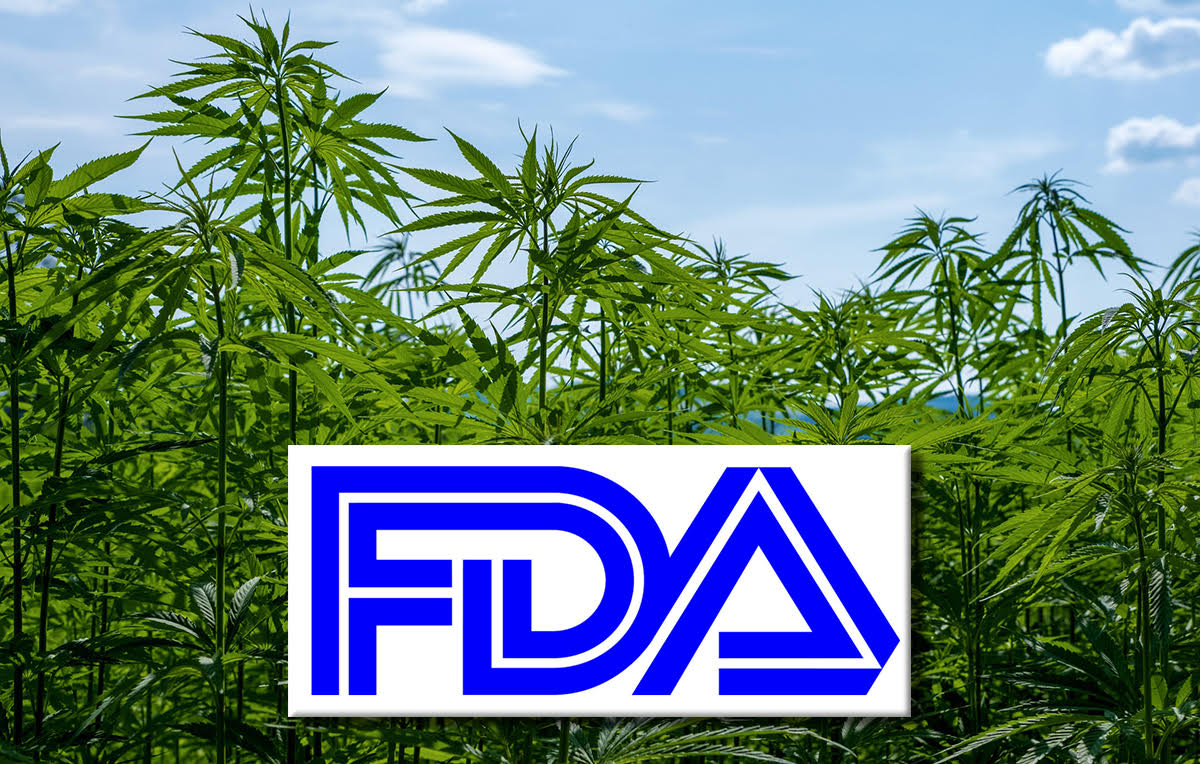
Agency Issues Warning Letters to 15 CBD Makers, Releases Consumer Guide Expressing Doubts About CBD Safety
By Steven Hoffman
As the USDA Takes Public Comments on Its Final Interim Rule for Hemp Production, FDA on November 25 Issued Warning Letters to 15 CBD Makers and Expressed Doubts about the Safety of CBD in a Newly Released CBD Consumer Guide
The U.S. Food and Drug Administration (FDA) seems to have flipped the Thanksgiving bird, so to speak, to the hemp and CBD industry when it issued on November 25 – the Monday before Thanksgiving – warning letters to 15 companies for allegedly selling products containing cannabidiol (CBD) in ways the agency said violate the Federal Food, Drug and Cosmetic (FD&C) Act.
On the same day, the FDA also released a revised Consumer Update – titled What You Need to Know (and What We’re Working to Find Out) About Products Containing Cannabis or Cannabis-derived Compounds, including CBD – that details the agency’s alleged safety concerns about CBD products, in particular the safety of CBD in food. In a blow to the burgeoning CBD marketplace, the FDA said it couldn’t conclude that CBD is safe for use in human or animal food.
Despite the 2018 Farm Bill removing hemp — defined as cannabis and cannabis derivatives with very low concentrations (no more than 0.3% on a dry weight basis) of THC — from the definition of marijuana in the Controlled Substances Act, CBD products are still subject to the same laws and requirements as FDA-regulated products that contain any other substance. “The FDA is concerned that people may mistakenly believe that trying CBD ‘can’t hurt,’” it said in the Consumer Guide. “The agency wants to be clear that we have seen only limited data about CBD’s safety and these data point to real risks that need to be considered,” the agency added.
The FDA expressed particular concerns in the Consumer Guide about potential liver toxicity, drug interactions and male reproductive toxicity. The FDA also stated that using CBD may have certain temporary side effects, including, among others, drowsiness, insomnia, gastrointestinal distress, decreased appetite, irritability, and agitation. The FDA says it is actively working to answer questions about science, safety and quality of products containing cannabis and cannabis-derived compounds, particularly CBD. It also said it wants to learn about and identify potential risks associated with cumulative exposure such as ongoing use and ingestible or topical use, the effect on special populations such as elderly, children, and pregnant or breastfeeding women, and the use of CBD by pets and other animals.
Bad Comparisons
However, Dr. Stuart Titus, CEO of Medical Marijuana, a publicly traded company which has created a CBD product line, challenged the FDA’s decision, telling Forbes, “The FDA has mistakenly substituted the adverse effects of Epidiolex, a refined, isolated and semi-synthetic form of CBD, as being the same form of CBD that is being sold by those in the nutritional supplement industry,” he said. “Nothing could be further from the truth. There is no evidence to show that botanical forms of CBD have much more ‘drug interaction’ than normal foods or that the natural botanical form of CBD confers the ‘toxic liver effects’ that the FDA mentions in its statement.”
Titus also told Forbes that the CBD industry, the Hemp Roundtable and the U.S. Hemp Authority have been working to increase their standards and industry-wide vigilance toward the quality of manufacturing, and other regulations regarding the production of a safe and well-tested form of CBD.
In a 2018 report, the World Health Organization found no adverse health effects but rather several medical applications for cannabidiol (CBD), despite FDA policy, reported Forbes. According to the WHO, naturally occurring CBD is safe and well tolerated in humans (and animals), and is not associated with any negative public health risks. Experts with the international health organization further stated that CBD does not induce physical dependence and is “not associated with abuse potential.” According to the WHO, people are not getting high off of CBD, either. “To date, there is no evidence of recreational use of CBD or any public health related problem associated with the use of pure CBD.”
Currently, writes Stephanie Savage of law firm Miller & Martin, Epidiolex is the only FDA-approved drug product containing CBD. The FDA believes that the new drug approval process is the best way to ensure the safety and effectiveness of new medicines, she says. Even though products are being marketed and sold as a food or dietary supplement, FDA asserts it is illegal to market CBD by adding it to a food or labeling it as a dietary supplement. The FDA is evaluating the regulatory frameworks that apply to certain cannabis-derived products that are intended for non-drug uses, including whether and/or how the FDA might consider updating its regulations, as well as whether potential legislation might be appropriate, she writes.
Calling Companies Out for Making Health Claims
In issuing the warning letters, the FDA says it identified 15 companies that “are using product webpages, online stores and social media to market CBD products in interstate commerce in ways that violate the FD&C Act, including marketing CBD products to treat diseases or for other therapeutic uses for humans and/or animals. Other violations include marketing CBD products as dietary supplements and adding CBD to human and animal foods, the agency said in a release.
“As we work quickly to further clarify our regulatory approach for products containing cannabis and cannabis-derived compounds like CBD, we’ll continue to monitor the marketplace and take action as needed against companies that violate the law in ways that raise a variety of public health concerns. In line with our mission to protect the public, foster innovation, and promote consumer confidence, this overarching approach regarding CBD is the same as the FDA would take for any other substance that we regulate,” said FDA Principal Deputy Commissioner Amy Abernethy, M.D., Ph.D., in a statement.
Michael Harinen, Chief Brand Officer at Louisville, CO-based Bluebird Botanicals, which makes hemp-derived CBD products, told Forbes that the FDA brought up valid concerns about companies that are selling products with unverified medical claims or are unsafe for human consumption. Some of the products are tainted with pesticides or herbicides, while others have little to no CBD in them, he said. “It’s affected our business because whenever the FDA comes out with an announcement, including this one, customers call us up,” said Harinen. “They are very wary and scrutinizing us. And they are concerned about the legal status of CBD.”
Companies receiving warning letters from the FDA include the following:
- Koi CBD LLC, Norwalk, California
- Pink Collections Inc., Beverly Hills, California
- Noli Oil, Southlake, Texas
- Natural Native LLC, Norman, Oklahoma
- Whole Leaf Organics LLC, Sherman Oaks, California
- Infinite Product Company LLLP, dba Infinite CBD, Lakewood, Colorado
- Apex Hemp Oil LLC, Redmond, Oregon
- Bella Rose Labs, Brooklyn, New York
- Sunflora Inc., Tampa, Florida / Your CBD Store, Bradenton, Florida
- Healthy Hemp Strategies LLC, dba Curapure, Concord, California
- Private I Salon LLC, Charlotte, North Carolina
- Organix Industries Inc., dba Plant Organix, San Bernardino, California
- Red Pill Medical Inc., Phoenix, Arizona
- Sabai Ventures Ltd., Los Angeles, California
- Daddy Burt LLC, dba Daddy Burt Hemp Co., Lexington, Kentucky
The FDA also stated it has previously sent warning letters to other companies it says were “illegally selling CBD products in interstate commerce that claimed to prevent, diagnose, mitigate, treat or cure serious diseases, such as cancer, or otherwise violated the FD&C Act. Some of these products were in further violation because CBD was added to food, and some of the products were also marketed as dietary supplements despite products which contain CBD not meeting the definition of a dietary supplement,” the FDA added in a release.
# # #
 Steven Hoffman is Managing Director of Compass Natural, providing brand marketing, PR, social media, and strategic business development services to natural, organic, sustainable and hemp/CBD products businesses. Compass Natural serves in PR and programming for NoCo Hemp Expo and Southern Hemp Expo, and Hoffman serves as Editor of the weekly Let’s Talk Hemp Newsletter, published by We are for Better Alternatives. Contact steve@compassnaturalmarketing.com.
Steven Hoffman is Managing Director of Compass Natural, providing brand marketing, PR, social media, and strategic business development services to natural, organic, sustainable and hemp/CBD products businesses. Compass Natural serves in PR and programming for NoCo Hemp Expo and Southern Hemp Expo, and Hoffman serves as Editor of the weekly Let’s Talk Hemp Newsletter, published by We are for Better Alternatives. Contact steve@compassnaturalmarketing.com.


